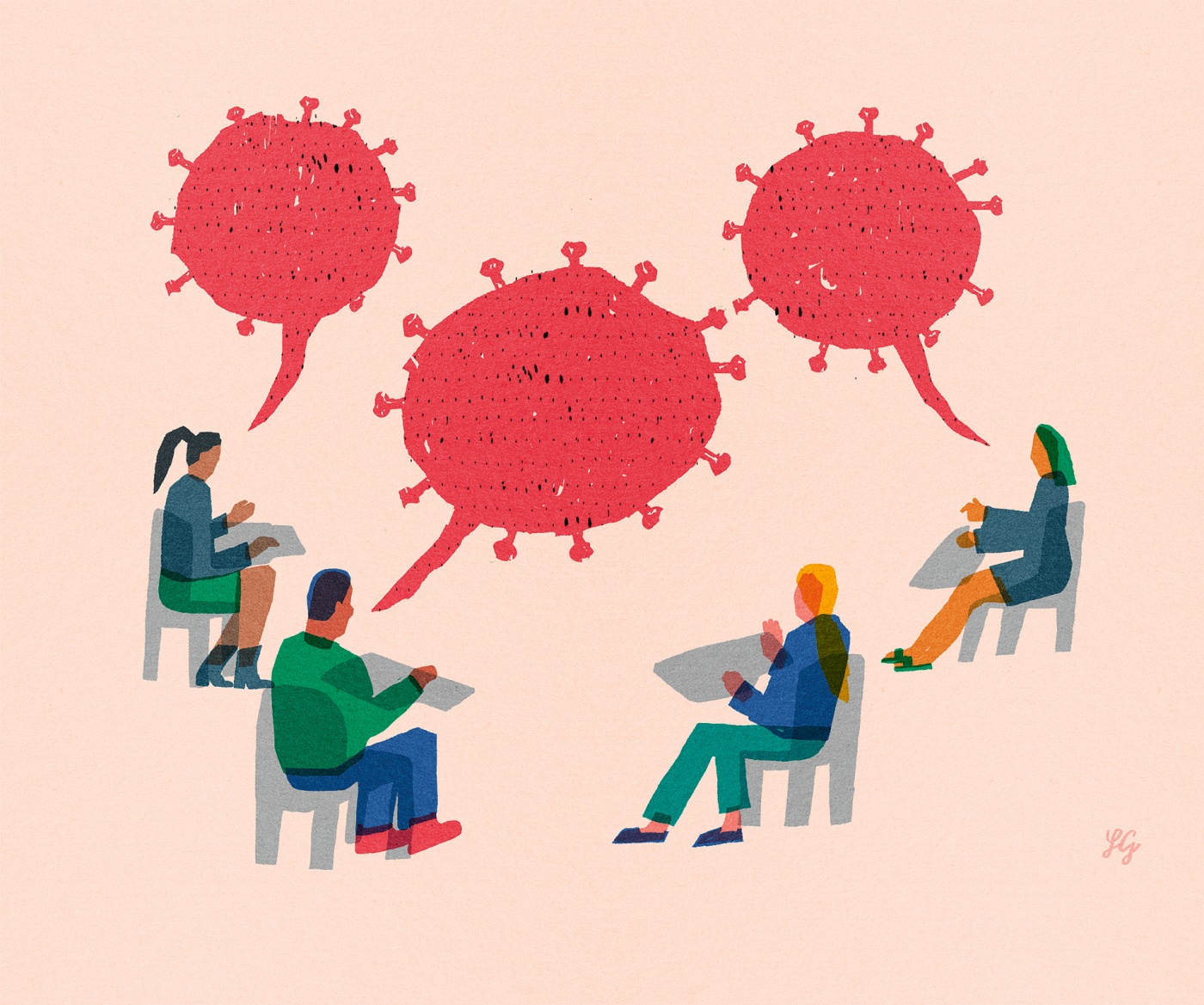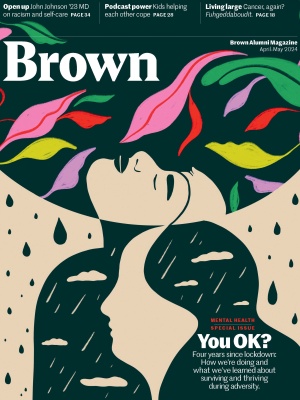“Coping with Covid” 101
A new course on the psychology of pandemics offers a scientific take on Covid-related mental health issues and a place for students to process.

When the pandemic hit in 2020, Adrian Lopez’s life was instantly downsized to his regular morning walk, the four walls of his room, and, most importantly, his journal.
Finishing high school and trapped by quarantine, Lopez filled hundreds of pages with musings, his first attempt at trying to process the pandemic’s impact on his life. “My life went from such an external focus to an internal journey,” he told his classmates in Psychology of Pandemics, a new seminar taught last fall by Psychology Professor Ruth Colwill. The course provided pandemic-affected students a place not only to study the latest psychological research on pandemics but to process their own experiences.
Every Friday afternoon, the group of two dozen students grappled with the latest academic theories around trauma and loss, resilience and conspiracy, informed by personal insights that came with living through Covid-19 themselves.
“Being able to talk about the pandemic in a group of 20 friends is really powerful,” says Lopez ’25, a neuroscience concentrator from Miami. “I’d been making sense of it on my own, but I was curious to hear what the literature said.”
Fresh Science
Students dug into the very latest research, journal articles such as “The Potential Impact of Covid-19 on Psychosis: a Rapid Review of Contemporary Epidemic and Pandemic Research” in Schizophrenia Research and “The Contagiousness of Memes: Containing the Spread of Covid-19 Conspiracy Theories in a Forensic Psychiatric Hospital” in the BJPsych Bulletin. They studied conspiracy theories, including how to evaluate the quality of source publications.
“We wanted to talk about how we can use the tools that psychology gives us to reach out to these people who have gone down the rabbit hole of conspiracy theories,” says Lars Seadale ’23, who helped design the course (see sidebar).
Victoria Valdes ’26, a cognitive neuroscience concentrator from Panama, particularly remembers learning about the mental-health toll on healthcare workers. “Their mental health—and their health in general—has never been prioritized,” she says.
Alexis Peetz Alio ’24 dug into the concept of “healthcare deserts” in Rhode Island using the mapping software ArcGIS and examining the positive and negative impacts of telehealth.
“This class did a great job of rooting what we’ve learned in real life,” he said.
Student Stories
Even as the course used neuroscience, psychology, and sociology to understand the psychological impacts of the pandemic, Colwill pushed students to share experiences from their own lives, a strategy rooted in her background in behavioral therapies. “For many students, this is the first time they’ve had to pause and think about the impact of the pandemic,” she says. “You can’t just discard memories or bury them. It’s important to process them.”
During a two and half hour session, students broke into groups to tackle questions like “How would life today be different if the Covid pandemic had never happened?” and “Design a product that fills a gap that became apparent during the Covid-19 pandemic.” Students expressed worries about declining social skills caused by pandemic lockdowns, a lack of trust in government, and mental health deterioration.
For a class full of science concentrators, the discussion was a welcome shift. “I really enjoy the community she has created,” Valdes says. “It’s so strong because of the stories we share.”
Colwill’s interest in teaching a course on pandemics didn’t emerge until in-person learning started up again at Brown, and she saw how much societal pressure was being applied to get people to embrace the idea of “normal” again. “It seemed the message was, ‘It’s over, get on with your life now,’” she says. “I thought it was odd that psychology hadn’t stepped up to address post-pandemic mental health.”
She started digging and found The Psychology of Pandemics, written pre-Covid by Steven Taylor, a professor of clinical psychology at the University of British Columbia, and published with eerie timing in 2020. Many of the concerns that Taylor brought up—from pandemic-related conspiracy theories to different reactions to the virus in anxious and non-anxious people—actually happened during Covid-19.
Taylor’s book became the backbone of the course, with weeks spent on differences in how people process information (“blunters” don’t want to hear the bad news, while “monitors” search it out), segments on the mental health impacts of the pandemic on healthcare workers, and the impact of the pandemic on animals and their owners.
Taylor spoke with the class towards the end of the semester and described a survey of 6,500 adults that showed that 20 percent had elevated anxiety and depression symptoms at a point during the pandemic when only 2 percent had so far been diagnosed with Covid. Mental health symptoms, Taylor said, can often have a longer and larger footprint than physical ones.
Flexible Design
Colwill’s course isn’t just about pandemics—it’s ready to outlast one.
With the help of Kristi Kaeppel, a learning designer at the Sheridan Center, Colwill designed the course so that it can be taken asynchronously via Zoom as well as in person, and students have choices over what form an assignment might take.
“I’m a big fan and proponent of resilient, flexible styles of learning, especially after the pandemic,” Kaeppel says.
One example is the capstone project. Students investigated a topic of their choice—from humor in the pandemic to the growth of mutual aid groups—in the form of their choice, from a standard essay to a video documentary.
For Lopez, the class has shifted his sights away from medical school. He’s feeling that a doctorate in clinical psychology might be in the cards now.
“I wanted to make sense of what’s happened to me,” he said. “Now I’m ready for the next pandemic.”




